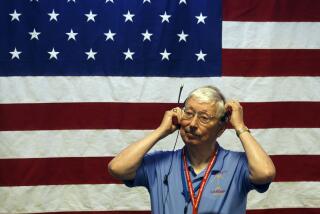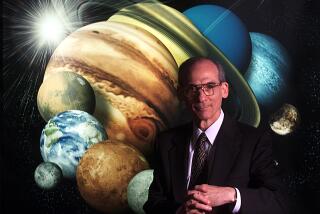Rocket scientist was a key figure in U.S. space program
- Share via
Ernst Stuhlinger, one of the last surviving German rocket scientists who came to America after World War II and formed the engineering foundation of the nation’s space program, died Sunday at his home in Huntsville, Ala. He was 94.
Stuhlinger had been in failing health for several months, according to the U.S. Space & Rocket Center in Huntsville.
Stuhlinger served as chief scientist for Wernher von Braun and was among the group of German scientists who moved with him to Huntsville in 1950 when the Army established the Ordnance Missile Laboratories.
The Von Braun team developed the propulsion system that helped NASA put a man on the moon in 1969.
Stuhlinger retired in 1975 as associate director of science at the Marshall Space Flight Center, where the Saturn V moon rocket was designed.
He later co-wrote a book about Von Braun, who died in 1977.
Born in Niederrimbach, Germany, on Dec. 19, 1913, Stuhlinger earned a doctorate in physics at the University of Tubingen.
Drafted into the German army, Stuhlinger fought on the Russian front before transferring to the science program led by Von Braun that was designing wartime V-2 rockets launched by the Nazi regime against London.
In a 1995 article for the Huntsville Times, Stuhlinger called the Nazi era “extremely deplorable” and said he and other German rocket engineers were working with an eye toward spaceflight, not weapons, at the end of the war.
“Yes, we did work on improved guidance systems, but late in 1944 we were convinced that the war would be over before new systems could be used on military rockets. However, we were convinced that somehow our work would find application in future rockets that would not aim at London, but at the moon,” Stuhlinger wrote.
Ralph Petroff, who helped spearhead efforts to restore the Space & Rocket Center’s original Saturn V rocket, said Stuhlinger’s scientific brilliance was unmatched.
In the 1950s, he conceived what eventually would become the Hubble Space Telescope. He also spent years exploring the possibilities of electric propulsion ion engines for deep-space travel.
Stuhlinger was “in many ways the most important technical figure from the golden age of space,” along with Von Braun and Russia’s Sergei Korolev, who developed the first artificial satellite, Sputnik, Petroff said.
Stuhlinger, who became a naturalized citizen in 1955, is survived by his wife, two sons and a daughter.
More to Read
Sign up for Essential California
The most important California stories and recommendations in your inbox every morning.
You may occasionally receive promotional content from the Los Angeles Times.












